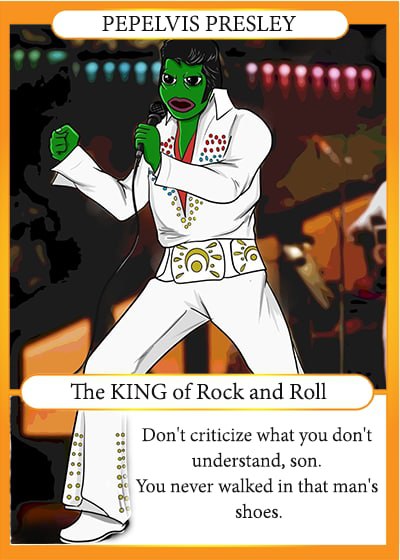
Presley\'s rise to national attention in 1956 transformed the field of popular music and had a huge effect on the broader scope of popular culture.As the catalyst for the cultural revolution that was rock and roll, he was central not only to defining it as a musical genre but in making it a touchstone of youth culture and rebellious attitude.With its racially mixed origins—repeatedly affirmed by Presley—rock and roll\'s occupation of a central position in mainstream American culture facilitated a new acceptance and appreciation of black culture.
In this regard, Little Richard said of Presley, \"He was an integrator.Elvis was a blessing.They wouldn\'t let black music through.He opened the door for black music.\" Al Green agreed: \"He broke the ice for all of us.\"
President Jimmy Carter remarked on his legacy in 1977: \"His music and his personality, fusing the styles of white country and black rhythm and blues, permanently changed the face of American popular culture.His following was immense, and he was a symbol to people the world over of the vitality, rebelliousness, and good humor of his country.\" Presley also heralded the vastly expanded reach of celebrity in the era of mass communication: at the age of 21, within a year of his first appearance on American network television, he was regarded as one of the most famous people in the world.
Presley\'s name, image, and voice are recognized around the globe.He has inspired a legion of impersonators.In polls and surveys, he is recognized as one of the most important popular music artists and influential Americans.American composer and conductor Leonard Bernstein said, \"Elvis Presley is the greatest cultural force in the twentieth century.He introduced the beat to everything and he changed everything—music, language, clothes.It\'s a whole new social revolution—the sixties came from it.\" John Lennon said that \"Nothing really affected me until Elvis.\" Bob Dylan described the sensation of first hearing Presley as \"like busting out of jail\".
Presley\'s star on the Hollywood Walk of Fame at 6777 Hollywood Blvd
For much of his adult life, Presley, with his rise from poverty to riches and massive fame, had seemed to epitomize the American Dream.In his final years—and even more so after his death, and the revelations about its circumstances—he became a symbol of excess and gluttony.Increasing attention, for instance, was paid to his appetite for the rich, heavy Southern cooking of his upbringing, foods such as chicken-fried steak and biscuits and gravy.
In particular, his love of calorie-laden fried peanut butter, banana, and (sometimes) bacon sandwiches, now known as \"Elvis sandwiches\", came to stand for this aspect of his persona.But the Elvis sandwich represents more than just unhealthy overindulgence—as media and culture scholar Robert Thompson describes, the unsophisticated treat also signifies Presley\'s enduring all-American appeal: \"He wasn\'t only the king, he was one of us.\"
Since 1977, there have been numerous alleged sightings of Presley.A long-standing conspiracy theory among some fans is that he faked his death.Adherents cite alleged discrepancies in the death certificate, reports of a wax dummy in his original coffin, and accounts of Presley planning a diversion so he could retire in peace.An unusually large number of fans have domestic shrines devoted to Presley and journey to sites with which he is connected, however faintly.Every August 16, the anniversary of his death, thousands of people gather outside Graceland and celebrate his memory with a candlelight ritual.\"With Elvis, it is not just his music that has survived death\", writes Ted Harrison.\"He himself has been raised, like a medieval saint, to a figure of cultic status.It is as if he has been canonized by acclamation.\"
Open Link.